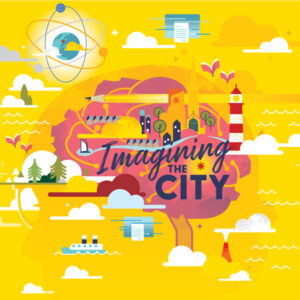As part of NCW’s Lit From the Inside programme, Freya Cushing took part in a climate writing workshop with UNESCO City of Literature virtual writer in residence Lynn Buckle. Here, Freya reflects on the positive impact of climate solutions in creative writing, and why we should change of the tone of climate writing from dystopia to a more positive, forward-thinking future.
As we move into 2021 the fight against climate change rages on.
I often wonder about the climate crisis and find myself hunting for information on climate change. I have watched many lectures on the topic, ranging from how education is the way forward, to how technology will be the planet’s saviour. It is easy to be caught up in the idea that technology is the answer and that scientists are the only people who can stop the inevitable destruction of the natural world. However, an alternative method of influencing has been introduced to me by Lynn Buckle who suggests that climate writing is a great way to introduce climate solutions into our everyday lives.
Although our lives may seem insignificant in the face of the global climate change problems there are many things that we can do. During a climate writing workshop developed by Lynn, we discussed what our own homes would be like in 50 years, making climate change a personal issue and making us realise how this is not so far away or an unrealistic futuristic concept.
The workshop demonstrated that young people should be writing about the climate and how books and other publications provide a record of today’s climate. Lynn also encouraged the use of positive messages and real examples of conservation in our writing. It was a clear message that we need to change the tone of climate writing from a dystopian warning into a positive, hopeful, forward-thinking personal message which is accessible to everyone.
we need to change the tone of climate writing from a dystopian warning into a positive, hopeful, forward-thinking personal message which is accessible to everyone
Successful climate writing should affect behaviour and this could be small things: for example, including a bird feeder or having a character use only second hand clothes from a charity shop. These small changes in everyday life can have a massive effect and I think placing this in modern media is highly influencing ,as it may change a young person’s point of view and have a larger ripple effect on the community and eventually on the environment.
There needs to be a change in the way people write about the climate crisis in fiction to start to influence people’s actions. Dystopian novels are entertaining and can be used to warn or even scare about the consequences of climate change, however, they tend to lack any real world solutions. Lynn’s mission is to influence writers to present a positive view and I personally believe that this is a great way to go.
We need to take action against climate change and by starting to incorporate this into our writing, it is a great way to start.
Imagining the City brings together five writers from UNESCO Cities of Literature across the world to explore connections between Norwich and their cities; link up with local writers; and work on a range of commissions. Read more
Image (c) Karsten Würth

